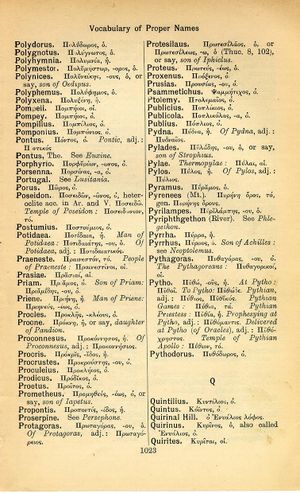Procne: Difference between revisions
Μέγ' ἐστὶ κέρδος, εἰ διδάσκεσθαι μάθῃς → Doceri si didiceris, est magnum lucrum → Es ist ein großer Vorteil, wenn du lernen lernst
m (Text replacement - "}}]]" to "}}]]") |
m (Text replacement - "(|thumb)\n(\|link=)" to "$1$2") |
||
| Line 1: | Line 1: | ||
{{WoodhouseENELnames | {{WoodhouseENELnames | ||
|Text=[[File:woodhouse_1023.jpg|thumb | |Text=[[File:woodhouse_1023.jpg|thumb|link={{filepath:woodhouse_1023.jpg}}]]Πρόκνη, ἡ, or say, <b class="b2">daughter of Pandion.</b> | ||
|link={{filepath:woodhouse_1023.jpg}}]]Πρόκνη, ἡ, or say, <b class="b2">daughter of Pandion.</b> | |||
}} | }} | ||
{{Lewis | {{Lewis | ||
Revision as of 17:00, 18 May 2020
English > Greek (Woodhouse)
Πρόκνη, ἡ, or say, daughter of Pandion.
Latin > English (Lewis & Short)
Procnē: ēs, v. Progne.
Latin > French (Gaffiot 2016)
Procnē¹⁴ (-gnē), ēs, f. (Πρόκνη),
1 Procné [fille de Pandion, changée en hirondelle] : Ov. M. 6, 440 || [poét.] une hirondelle : Virg. G. 4, 15
2 île voisine de Rhodes : Plin. 5, 133.
Latin > German (Georges)
Procnē (Prognē), ēs, f. (Πρόκνη), I) Tochter des attischen Königs Pandion, Schwester der Philomela und Gemahlin des trazischen Königs Tereus, wurde in eine Schwalbe verwandelt (s. Philomēladas Nähere), Ov. met. 6, 440. Hyg. fab. 45 u.a. – II) meton., die Schwalbe, Verg. georg. 4, 15. Ov. fast. 2, 855; trist. 5, 1, 60: Progne inter asseres minuriens, Sidon. epist. 2, 2, 14.

